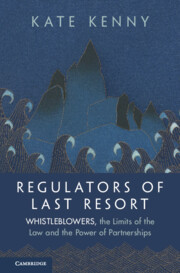Book contents
- Regulators of Last Resort
- Regulators of Last Resort
- Copyright page
- Dedication
- Contents
- Acknowledgements
- Prologue
- 1 When Official Channels Fail Whistleblowers
- 2 Lawfare Tactics and Legal Advice at Theranos
- 3 Whistleblowing Subcultures at Amazon
- 4 The Facebook Whistleblower and the Journalist
- 5 Advocates and the Immigration Detention Centre
- 6 Public Whistleblowing as Collective Bricolage
- Appendix 1 Ignoring Public Whistleblowers: Literature, Method and Analysis
- Appendix 2 A Legal Revolution
- References
- Index
5 - Advocates and the Immigration Detention Centre
Published online by Cambridge University Press: 05 December 2024
- Regulators of Last Resort
- Regulators of Last Resort
- Copyright page
- Dedication
- Contents
- Acknowledgements
- Prologue
- 1 When Official Channels Fail Whistleblowers
- 2 Lawfare Tactics and Legal Advice at Theranos
- 3 Whistleblowing Subcultures at Amazon
- 4 The Facebook Whistleblower and the Journalist
- 5 Advocates and the Immigration Detention Centre
- 6 Public Whistleblowing as Collective Bricolage
- Appendix 1 Ignoring Public Whistleblowers: Literature, Method and Analysis
- Appendix 2 A Legal Revolution
- References
- Index
Summary
An emerging strategy of ‘information matchmaking’ is being developed by experienced whistleblower advocates. This operates on the principle that an effective legal campaign needs a PR campaign running alongside it, in public whistleblowing cases. Information matchmaking involves advocates connecting whistleblowers with suitable partners: subject-expert journalists, activists, lawyers, academics, political figures – and any other party whose interests align with the information coming to light. If successful, the outcome is twofold: the whistleblowing disclosure reaches its intended audience and the wrongdoing is stopped, while the public whistleblower benefits from the personal and professional support of a chain of campaigners all committed to a common cause. The experiences of Dawn Wooten, a nurse at a US Immigration and Customs Enforcement (ICE) detention centre in Georgia, illustrates. Dawn spoke up about forced sterilization of immigrant women, along with insufficient protections against the first waves of COVID-19. Her case demonstrates how effective whistleblower advocacy demands significant empathy and care on the part of the advocate, as well as persistence and tactical skills. But these campaigns come with challenges. The landscape is often uncertain for people who disclose. And inequality among whistleblowers amplifies the uncertainty.
Keywords
- Type
- Chapter
- Information
- Regulators of Last ResortWhistleblowers, the Limits of the Law and the Power of Partnerships, pp. 138 - 160Publisher: Cambridge University PressPrint publication year: 2024

